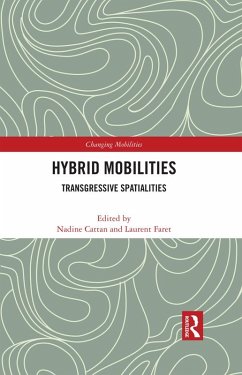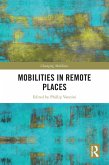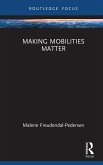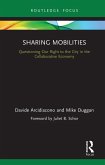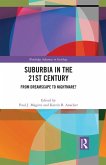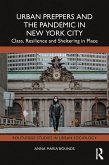Hybrid Mobilities (eBook, ePUB)
Transgressive Spatialities
Redaktion: Cattan, Nadine; Faret, Laurent
43,95 €
43,95 €
inkl. MwSt.
Sofort per Download lieferbar

22 °P sammeln
43,95 €
Als Download kaufen

43,95 €
inkl. MwSt.
Sofort per Download lieferbar

22 °P sammeln
Jetzt verschenken
Alle Infos zum eBook verschenken
43,95 €
inkl. MwSt.
Sofort per Download lieferbar
Alle Infos zum eBook verschenken

22 °P sammeln
Hybrid Mobilities (eBook, ePUB)
Transgressive Spatialities
Redaktion: Cattan, Nadine; Faret, Laurent
- Format: ePub
- Merkliste
- Auf die Merkliste
- Bewerten Bewerten
- Teilen
- Produkt teilen
- Produkterinnerung
- Produkterinnerung

Bitte loggen Sie sich zunächst in Ihr Kundenkonto ein oder registrieren Sie sich bei
bücher.de, um das eBook-Abo tolino select nutzen zu können.
Hier können Sie sich einloggen
Hier können Sie sich einloggen
Sie sind bereits eingeloggt. Klicken Sie auf 2. tolino select Abo, um fortzufahren.

Bitte loggen Sie sich zunächst in Ihr Kundenkonto ein oder registrieren Sie sich bei bücher.de, um das eBook-Abo tolino select nutzen zu können.
The diversity of mobility situations studied in this book highlights the contribution of the reality of mobility in the daily construction of urban, regional and global spaces, as well as in the redefinition of socio-spatial concepts.
- Geräte: eReader
- mit Kopierschutz
- eBook Hilfe
Andere Kunden interessierten sich auch für
![Mobilities in Remote Places (eBook, ePUB) Mobilities in Remote Places (eBook, ePUB)]() Mobilities in Remote Places (eBook, ePUB)42,95 €
Mobilities in Remote Places (eBook, ePUB)42,95 €![Making Mobilities Matter (eBook, ePUB) Making Mobilities Matter (eBook, ePUB)]() Malene Freudendal-PedersenMaking Mobilities Matter (eBook, ePUB)21,95 €
Malene Freudendal-PedersenMaking Mobilities Matter (eBook, ePUB)21,95 €![Sharing Mobilities (eBook, ePUB) Sharing Mobilities (eBook, ePUB)]() Davide ArcidiaconoSharing Mobilities (eBook, ePUB)23,95 €
Davide ArcidiaconoSharing Mobilities (eBook, ePUB)23,95 €![Suburbia in the 21st Century (eBook, ePUB) Suburbia in the 21st Century (eBook, ePUB)]() Suburbia in the 21st Century (eBook, ePUB)43,95 €
Suburbia in the 21st Century (eBook, ePUB)43,95 €![Instituting Worlds (eBook, ePUB) Instituting Worlds (eBook, ePUB)]() Instituting Worlds (eBook, ePUB)43,95 €
Instituting Worlds (eBook, ePUB)43,95 €![Bushwick's Bohemia (eBook, ePUB) Bushwick's Bohemia (eBook, ePUB)]() Mario HernandezBushwick's Bohemia (eBook, ePUB)42,95 €
Mario HernandezBushwick's Bohemia (eBook, ePUB)42,95 €![Urban Preppers and the Pandemic in New York City (eBook, ePUB) Urban Preppers and the Pandemic in New York City (eBook, ePUB)]() Anna Maria BoundsUrban Preppers and the Pandemic in New York City (eBook, ePUB)40,95 €
Anna Maria BoundsUrban Preppers and the Pandemic in New York City (eBook, ePUB)40,95 €-
-
-
The diversity of mobility situations studied in this book highlights the contribution of the reality of mobility in the daily construction of urban, regional and global spaces, as well as in the redefinition of socio-spatial concepts.
Dieser Download kann aus rechtlichen Gründen nur mit Rechnungsadresse in A, B, BG, CY, CZ, D, DK, EW, E, FIN, F, GR, HR, H, IRL, I, LT, L, LR, M, NL, PL, P, R, S, SLO, SK ausgeliefert werden.
Produktdetails
- Produktdetails
- Verlag: Taylor & Francis eBooks
- Seitenzahl: 298
- Erscheinungstermin: 30. Juli 2021
- Englisch
- ISBN-13: 9781000438079
- Artikelnr.: 62387066
- Verlag: Taylor & Francis eBooks
- Seitenzahl: 298
- Erscheinungstermin: 30. Juli 2021
- Englisch
- ISBN-13: 9781000438079
- Artikelnr.: 62387066
- Herstellerkennzeichnung Die Herstellerinformationen sind derzeit nicht verfügbar.
Nadine Cattan is research director in geography at the French National Center for Scientific Research (CNRS). She was previously director of a unit on territorial indicators and statistics at the OECD. She has also chaired an expert group on gateways at the DATAR, the French government's regional development planning agency. Her main research interests aim to understand how mobilities are likely to modify society's relationships to space and so lead to a reinterpretation of spatial concepts and theories. She has provided a critical overview on the issues of polycentrism and spatial integration in Europe. She has also developed spatial models to explain how metropolitan areas are being transformed. Her current research integrates gender to understand how genders contribute to reshaping territorialities and urban space. Her published works include: Cities and networks in Europe. A critical approach of polycentrism (2007) and Atlas mondial des sexualités. Libertés, plaisirs et interdits (2016). Laurent Faret is a professor of geography at the University of Paris, a member of CESSMA, and currently on research leave at CIESAS (Centro de Investigaciones y Estudios Superiores en Antropología Social) in Mexico City, with the Research Institute for Development (IRD). He is a member of the LMI MESO, an international collaborative program between France, Mexico, and Central American countries. His research interests include: the evolution of international migration dynamics and the related territorial and political transformations; the urban dynamics resulting from transit movements and settlement of mobile populations; and the production of transnational mobility spaces and their effects on the dynamics of development in the Global South, at different scales. He is the author or editor of various books on these themes, such as Migrant Protection and the City in the Americas (2021), Les circulations transnationales. Lire les turbulences migratoires contemporaines (2009), Migrants des Suds (2009), and Les territoires de la mobilité. Migration et communautés transnationales entre le Mexique et les Etats-Unis (2003).
Introduction: When Mobilities Construct Spatialities Part I - A Relational
Approach: Insights into the Building of Sociospatial Concepts 1. Tenements
in New York and Riads in Marrakesh: Mobilities and the New Paradigm of
Heritagization 2. Urban Mobilities and Power: Social Exclusion by Design in
the City 3. Rethinking 'Ethnic Neighborhoods' after the Mobility Turn 4.
Clouds and Movements 5. Transportation Vehicles in Africa: Between Autonomy
and the Administration of Space Part II - Spatial Practices of the City:
Power Relations and Agency 6. Migrant Women Servants in Amman and
Backpackers in Bangkok: The 'Walking Interviews' Method for Studying Mobile
Groups in Cities 7. Padlocks as Obscure Objects of Tourism. An Emotional
Imprint in the City of Love 8. Transgressing the City-State: Migrant
Domestic Workers in Singapore 9. Everyday Mobility and the Social Divisions
of Space: A Space-Time Analysis of Mexico City Part III - Mobility Schemes,
Values, and Norms: A Sociopolitical Perspective 10. Immobility as A
Migration-Management Resource in Seasonal Agricultural-Worker Programs 11.
Stranded Migrants, Mobile Subjects: The Spatiality and Social Order of
'Waiting' in Mexico 12. Facing the Environmental Transition: The Critical
Issue of Grasping Mobile Spatialities at the Crossroads of (Un)Changing
Practices and Policies 13. Work and High Mobility: Current Knowledge and
Blind Spots Afterword: Hybridities, Transgressions, and Stranded Mobilities
Approach: Insights into the Building of Sociospatial Concepts 1. Tenements
in New York and Riads in Marrakesh: Mobilities and the New Paradigm of
Heritagization 2. Urban Mobilities and Power: Social Exclusion by Design in
the City 3. Rethinking 'Ethnic Neighborhoods' after the Mobility Turn 4.
Clouds and Movements 5. Transportation Vehicles in Africa: Between Autonomy
and the Administration of Space Part II - Spatial Practices of the City:
Power Relations and Agency 6. Migrant Women Servants in Amman and
Backpackers in Bangkok: The 'Walking Interviews' Method for Studying Mobile
Groups in Cities 7. Padlocks as Obscure Objects of Tourism. An Emotional
Imprint in the City of Love 8. Transgressing the City-State: Migrant
Domestic Workers in Singapore 9. Everyday Mobility and the Social Divisions
of Space: A Space-Time Analysis of Mexico City Part III - Mobility Schemes,
Values, and Norms: A Sociopolitical Perspective 10. Immobility as A
Migration-Management Resource in Seasonal Agricultural-Worker Programs 11.
Stranded Migrants, Mobile Subjects: The Spatiality and Social Order of
'Waiting' in Mexico 12. Facing the Environmental Transition: The Critical
Issue of Grasping Mobile Spatialities at the Crossroads of (Un)Changing
Practices and Policies 13. Work and High Mobility: Current Knowledge and
Blind Spots Afterword: Hybridities, Transgressions, and Stranded Mobilities
Introduction: When Mobilities Construct Spatialities Part I - A Relational
Approach: Insights into the Building of Sociospatial Concepts 1. Tenements
in New York and Riads in Marrakesh: Mobilities and the New Paradigm of
Heritagization 2. Urban Mobilities and Power: Social Exclusion by Design in
the City 3. Rethinking 'Ethnic Neighborhoods' after the Mobility Turn 4.
Clouds and Movements 5. Transportation Vehicles in Africa: Between Autonomy
and the Administration of Space Part II - Spatial Practices of the City:
Power Relations and Agency 6. Migrant Women Servants in Amman and
Backpackers in Bangkok: The 'Walking Interviews' Method for Studying Mobile
Groups in Cities 7. Padlocks as Obscure Objects of Tourism. An Emotional
Imprint in the City of Love 8. Transgressing the City-State: Migrant
Domestic Workers in Singapore 9. Everyday Mobility and the Social Divisions
of Space: A Space-Time Analysis of Mexico City Part III - Mobility Schemes,
Values, and Norms: A Sociopolitical Perspective 10. Immobility as A
Migration-Management Resource in Seasonal Agricultural-Worker Programs 11.
Stranded Migrants, Mobile Subjects: The Spatiality and Social Order of
'Waiting' in Mexico 12. Facing the Environmental Transition: The Critical
Issue of Grasping Mobile Spatialities at the Crossroads of (Un)Changing
Practices and Policies 13. Work and High Mobility: Current Knowledge and
Blind Spots Afterword: Hybridities, Transgressions, and Stranded Mobilities
Approach: Insights into the Building of Sociospatial Concepts 1. Tenements
in New York and Riads in Marrakesh: Mobilities and the New Paradigm of
Heritagization 2. Urban Mobilities and Power: Social Exclusion by Design in
the City 3. Rethinking 'Ethnic Neighborhoods' after the Mobility Turn 4.
Clouds and Movements 5. Transportation Vehicles in Africa: Between Autonomy
and the Administration of Space Part II - Spatial Practices of the City:
Power Relations and Agency 6. Migrant Women Servants in Amman and
Backpackers in Bangkok: The 'Walking Interviews' Method for Studying Mobile
Groups in Cities 7. Padlocks as Obscure Objects of Tourism. An Emotional
Imprint in the City of Love 8. Transgressing the City-State: Migrant
Domestic Workers in Singapore 9. Everyday Mobility and the Social Divisions
of Space: A Space-Time Analysis of Mexico City Part III - Mobility Schemes,
Values, and Norms: A Sociopolitical Perspective 10. Immobility as A
Migration-Management Resource in Seasonal Agricultural-Worker Programs 11.
Stranded Migrants, Mobile Subjects: The Spatiality and Social Order of
'Waiting' in Mexico 12. Facing the Environmental Transition: The Critical
Issue of Grasping Mobile Spatialities at the Crossroads of (Un)Changing
Practices and Policies 13. Work and High Mobility: Current Knowledge and
Blind Spots Afterword: Hybridities, Transgressions, and Stranded Mobilities
